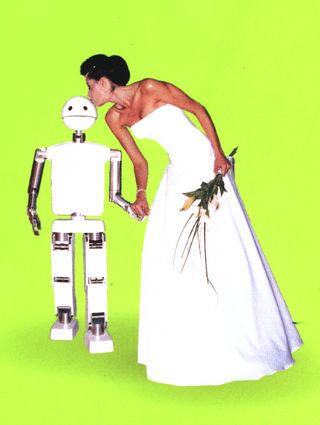More Robot Sex
I suppose if I am going to post on crazy-ass movies like Robotrix I would be remiss if I didn’t also briefly review a non-crazy book like David Levy’s Love and Sex with Robots: The Evolution of Human-Robot Relationships. From the cover art:

Only fitting. Other little boys seemed to want to grow up to be Batman or G.I. Joe, but I wanted to be Victor Frankenstein.
Levy’s is a good book, though not as exciting as I might have hoped. Levy divides his book neatly into sections on Love and Sex. Love comes across as somewhat ploddingly earnest, an exposition of the almost-obvious. People get attached to objects, don’t they? They very much love their non-human pets, don’t they? They already get attached to robot pets like Tamagotchi and the Sony AIBO. So we can probably expect that when there are humanoid robots that act at least sort-of human, the attachments will get all the deeper.
Yes, I can see that. Even as of 2001, some robots were already looking pretty human:

In the second part, Sex, things do perk up a bit. There’s a lot of good history and exposition here of devices and potential technological precursors to full-fledged sexbots: virtual reality, sex dolls, vibrators and other sex machines are all covered. There’s even an eye-opening account of the teledildonic pleasuring of Net Michelle by Violet Blue at the New York Museum of Sex in 2005 (see p. 267). There are also extended discussions of why men and, perhaps more interestingly, women pay others for sex.
Levy, himself an expert in artificial intelligence, thinks that robots sufficiently appealing to humans to be not just exotic sex toys but something like real partners will likely be in production by about 2050, which might be right — it’s in any event less optimistic than “singularity is near” estimates put out by the likes of Ray Kurzweil. And Levy also thinks that prevailing social trends will make robot sex and possibly even human-robot marriages much more acceptable.
(You mean we have to wait another four decades before you can buy your own robot Selena off of Amazon.com?)

(Life is not fair.)
I’ll offer a technical quibble, which is that the kind of artificial intelligence necessary to make a robot good enough to want to marry would be such a formidable technological breakthrough that we really would be living in an entirely different technological universe, possibly a post-human one in which it would become unclear how or even whether a distinctively human concept like “marriage” would apply. Another possibility, one which Levy himself does not discuss, is that we might be able to make human-like robots whose intelligence rests on modified human whole-brain emulations rather than on hand-coded artificial intelligence. This possibility is one which I’ve written about on ErosBlog before and which is the fictional premise behind the ripping-good science fiction novel Saturn’s Children (by Charlie Stross), which is the book you ought to be reading if you really just want to have fun with this topic.
Though the mention of Saturn’s Children brings up an additional, cautionary thought. In Stross’s novel, ordinary biological human beings die out completely, probably in large measure because robots are more fun to be with than people. Depending on your point of view, you might find that rather sad.
Shorter URL for sharing: https://www.erosblog.com/?p=3495









I read everything Charlie writes. Also love Richard K Morgan and John Scalzi, if anyone cares, heh.
For more on the subject, there’s Tom Smith’s song, Pygmalion 2.0 SP1. Lyrics at:
http://www.toms...0.htm
since I’m a Charles Stross fan and I haven’t read that one a spoiler warning would have been nice
Uber, IMO there’s nothing spoiled there. To be more precise than Faustus was, the book takes place subsequent to the human die out — a fact which is revealed very very early in the book. It’s part of the world-setting, not the plot.
No spoilers. Those facts are on the cover flap.
cool
“I’ll offer a technical quibble, which is that the kind of artificial intelligence necessary to make a robot good enough to want to marry would be such a formidable technological breakthrough that we really would be living in an entirely different technological universe…”
I’m glad you brought this up, since this always stopped me when people made wildly optimistic claims like, “People will marry robots!” I always wondered what kind of person would want to marry what currently amounts to a giant sex toy, but never saw this brought up as a possible difficulty in the few articles I saw about it. Without having read the book, it sounds like Levy puts all human bonds on a rather insipid level. I wonder why that is?
at the risk of being trite and unlettered :) what about Cherry 2000?
I remember thinking at first view of this movie one late night of insomnia some time ago, that every man should have to watch this movie. That was before I grew up though.
(back to quietly enjoying the website for me :) )
Molly might not be familiar with Star Wars but images of the ‘robots’ C-3PO and R2D2 are easy to come by. C-3PO looks humanoid. R2D2 looks like a round domed white trashcan or vacuum cleaner. Within a few minutes of the opening of the film both ‘characters’ behave in a way that elicits empathy from viewers willing to suspend their disbelief (the fact is they were humans in costumes). The R2D2 character is interesting because he/it doesn’t have a ‘face’, doesn’t ‘speak’ like a human–only squeaks and beeps as a machine might and isn’t biomorphic. For anyone who has had a real passion for a classic car or enjoys watching the TV set to the exclusion of going out side into the ‘real’ world I don’t think it’s such a leap to imagine people actually coming to prefer interacting with benign robots rather than impatient fellow humans.
A.S. Byatts’ ‘Possession’ has one of the best examples of two well meaning adults misunderstanding each other for half a lifetime that I’ve ever read. Picards’ Star Trek is a fantasy but the most touching tales are the ones where the android character ‘Data’ has his humanity tested. The episode in which that very notion and the idea that he might be ‘sentient’ and no one else’s ‘property’ are put on trial play with the very essence of what it means to be a ‘free person’.
I’ve spent much of my life taking care of the very young and the very old. Both groups could very much benefit from having a benevolent companion. And I don’t think most people are seeking ‘sex’ from the internet–I think we want to connect in a primal, unbridled way and we just can’t figure out how to do that to our complete satisfaction in the meat world.
Am I the only one that got a copy of this movie and watched it because of your post?? Ha! Ha! Very cheesy, but the topless women more than made up for it!! I didn’t catch her name, but the lead actress was absolutely beautiful. I wonder what she looks like today!
I’ll guess that you could find people wanting to marry all sorts of inanimate objects already today. People actually do marry all sorts of animals in SE Asia (unconsummated spiritual marriages, I think, like “brides of Christ”?). People already want to marry anything, because marriage can mean anything to somebody.
I will be more interested when robots want to marry humans. I hope my Stepford wife doesn’t demand more sex than I can provide, or beat me, or leave me when I am aging more poorly than her. What can an organic man do in an inorganic woman’s world?
Everyone loves a sexy robot.
For you robot lovers out there, there is also:
From the “golden age” of adult films, you can’t beat the 1978 movie “SexWorld”. It’s like a Disney World vacationland for realizing your sexual fantasies.
It featured several top porn stars of the day, and it’s been called one of the best adult movies ever made.
Also there’s “Blade Runner” with sexy robots Daryl Hannah and Sean Young… The “Cameron” character from the “Terminator” movies… “Number 6” from “Battlestar Galactica”… Angelina Jolie from “Cyborg 2″… Winona Ryder from the “Alien Resurection” movie… Alice (Milla Jovovich) from the “Resident Evil” series… Vanessa (Liz Hurley) from the Austin Powers movies who turned out to be a fembot… and “Seven of Nine” from the “Star Trek” series was essentially robotic, or at least was at one time…
hi i am marred
to a radio and he is
so cool
and he can have sex
with me and if you are
wornding how
a high wave sinigel
i can not have sex
with a human
bkus i have the dissis
that if i do
me or the baby will
dye at burth